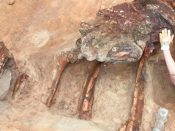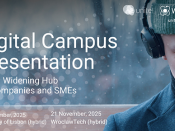Por Michael Levin (Tufts University, MA Wyss Instiute, Harvard University).
In this talk, I will describe our work on collective intelligence and agency in unconventional embodiments. I will show how developmental bioelectricity is a kind of cognitive glue, functioning to bind competent subunits (cells) into higher-level agents that solve problems in anatomical morphospace. I will highlight ways in which this work enables specific deep concepts in philosophy of mind to have practical consequences and impacts in the development of new therapeutics for birth defects, regeneration, and cancer. I will end by discussing our novel life forms, in the context of the space of possible embodied minds, which have impacts not only on bioengineering but also on systems of ethics and relationships with sentient beings of diverse provenance and composition.
Bio: Michael Levin is the Vannevar Bush Distinguished Professor of Biology at Tufts University, and associate faculty at Harvard’s Wyss Institute. He serves as the director of the Allen Discovery Center at Tufts and the co-director of the Institute for Computationally Designed Organisms at Tufts/UVM. He has published over 400 peer-reviewed publications across developmental biology, computer science, and philosophy of mind. Dr. Levin received dual B.S. degrees in computer science and biology, followed by a Ph.D. from Harvard with Clifford Tabin. His graduate work on the molecular basis of left-right asymmetry (Cell 1995) was chosen by the journal Nature as a “Milestone in Developmental Biology in the last century”. He did post-doctoral training at Harvard School of Medicine in cell biology, and started his independent lab in 2000, developing the first molecular tools to read and write bioelectric prepatterns in non-neural tissue. His group at Tufts works to understand information processing and problem-solving across scales, in a range of naturally evolved, synthetically engineered, and hybrid living systems. The Levin lab has pioneered approaches to organ regeneration, cancer reprogramming, non-genetic modification of the bodyplan, and the engineering of novel living proto-organisms. Using tools from behavioral and computer science, Dr. Levin seeks to understand the collective intelligence of cells and harness their problem-solving capacities for applications in birth defects, regeneration, cancer, and synthetic bioengineering.
Transmissão via Zoom - o link será disponibilizado no dia do seminário.





















